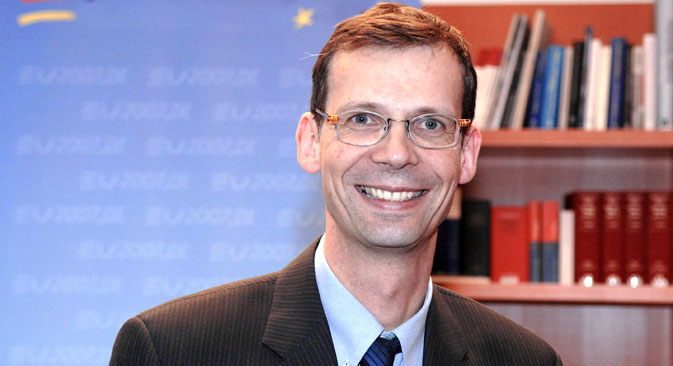
Uwe Corsepius, General Secretary of the Council of the European Union, is banned from visiting Russia, according to the Moscow's blacklist. Source: DPA / Vostockphoto
Business daily Kommersant reports that on the eve of June’s EU summit, at which the question of extending sanctions against Russia will be considered, relations between Moscow and Brussels have been shaken by a new scandal. The Russian side has provided the EU with a list of 89 European politicians and military figures who are banned from entering Russia.
The majority of those on the list represent countries that have taken a tough stance on Russia: the blacklist includes the UK’s former deputy prime minister Nick Clegg and General Secretary of the Council of the European Union Uwe Corsepius, who is soon to become an adviser to German Chancellor Angela Merkel. The publication notes that the blacklist does not include any representatives of countries that have made conciliatory gestures toward Moscow.
According to experts polled by the newspaper, although Moscow’s blacklist will not serve as a deciding factor in the EU’s decision on the sanctions, it brings the confrontation to a new level.
“The scandal inflames passions even further on the eve of the EU summit. At the same time, by making the list public, Moscow was in no way aiming for an escalation, but was merely attempting to minimize the effect of future scandals,” Arkady Moshes, director of the Russian program at the Finnish Institute of International Relations, told Kommersant.
In comments to the newspaper, head of the Department of Strategic Assessment at the Russian Academy of Sciences' Center for Situational Analysis Sergei Utkin said that an approach like this would not promote dialogue and the reduction of tensions.
“A number of individuals on the list have talked, alongside the criticism, about the necessity of finding a solution to the current problems together with Russia. Now this measure taken by Moscow will push them into toughening their position,” said Utkin.
The daily newspaper RBK reports that Ukrainian President Petro Poroshenko has appointed former Georgian president Mikheil Saakashvili governor of the Odessa Region. Experts interviewed by the newspaper say that the Ukrainian authorities are hoping for a repeat of the “Georgian [economic] miracle,” though in the current conditions in Ukraine this will be difficult.
RBK writes that Saakashvili has already outlined several priority tasks. He has promised to a thorough shake-up of the city administration and the law-enforcement agencies, to root out corruption, and work on developing tourism and city infrastructure.
“In Georgia, Saakashvili was successful as a reformer, and was able to carry out systematic reforms, but I am skeptical about his appointment to the post of head of the regional state administration, since the legislative framework does not provide regional authorities with great room for maneuver,” Ukrainian political analyst Yulia Bidenko said in comments to RBK.
“Saakashvili would be more effective at the level of the central Kiev authorities, where he could propose a systematic solution to problems, because carrying out significant reforms on a regional level, without reforming a state that is still highly centralized on the whole, is impossible,” said Bidenko.
The publication adds that many Ukrainian experts remark that the appointment of Saakashvili as governor could be a starting point for him on his way to the premiership.
China’s development bank has announced that more than $890 billion will be invested into the “One Belt, One Road” project to create a new Silk Road, reports the centrist newspaper Nezavisimaya Gazeta. The money is to be used to fund 900 projects in 60 countries.
At an international forum in the Chinese city of Chongqing, China’s vice premier Zhang Gaoli announced that China is seeking to construct six economic corridors in order to link Asia with Europe, one of which will follow the China-Mongolia-Russia axis, explains the publication.
Alexander Larin, a leading researcher at the Russian Academy of Sciences’ Institute of the Far East, told Nezavisimaya Gazeta that while before foreign investments in the Chinese economy significantly exceeded Chinese investments abroad, now the situation has changed.
“The ultimate goal of Beijing is to profit from its investments, and chiefly – to obtain access for its goods on the markets of other countries and access to their mineral resources,” said Larin.
The publication reminds its readers that Chinese President Xi Jinping and his Russian counterpart Vladimir Putin have signed a document on the joint development of the Eurasian Economic Union and the Silk Road. Furthermore, China and Russia have already agreed on the creation of a high-speed railway from Moscow to Beijing: Trains between the two capitals will be able to reach their destination in just 33 hours.
However, Larin points out that for the Trans-Siberian, the Silk Road will bring negative consequences: “The new railway will be much better equipped. From a route linking the Far East and Europe, the Trans-Siberian will become a line used only to transport local goods. The Trans-Siberian’s deficiencies are its low speed and high traffic volume,” he said.
All rights reserved by Rossiyskaya Gazeta.
Subscribe
to our newsletter!
Get the week's best stories straight to your inbox